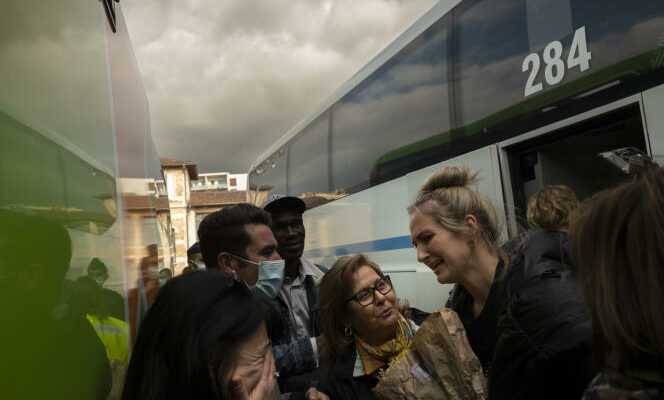Two weeks after the start of the Russian offensive in Ukraine, the reception of refugees in France is being organized, in a mixture of all-out mobilization, uncertainty and apprehension. Officially, more than 10,500 people have arrived from Ukraine since February 25. But this figure is actually an estimate of the border police, which does not detect all crossings. In addition, many Ukrainians only pass through France to go to other European countries, such as Spain or Portugal, where the communities already present are more numerous. Nobody today knows how to grasp very finely the reality of the Ukrainian presence in France.
In the evening of Friday March 11, the Minister of the Interior, Gérald Darmanin, announced on Twitter the forthcoming reception of 2,500 Ukrainian refugees in Moldova as part of a broader operation of transfers to voluntary countries, coordinated by the European Commission.
While the European Union has decided to grant temporary protection to Ukrainians, nearly 800 adults already benefit from it in France. We also know that some 4,500 people fleeing the war have already been housed by the State, mainly in Ile-de-France, but also in Hauts-de-France or Grand-Est. On Friday, more than half were still in these accommodations. Two-thirds of them are women and children. There are also a third of non-Ukrainians, including students or residents from the Maghreb, West Africa and Pakistan, some of whom are French-speaking.
“It is by chance that we are in France”
In the first reception center opened in the 18and arrondissement of Paris and managed by the association France Terre d’Asile (FTDA), which acts as a drop-off point, we met Nicolas Plieshu on Thursday. This Ukrainian has been living in France for two years now, where he moonlights in construction. He accompanies his wife and 10-year-old son, who arrived from Kiev the day before, to the first reception centre. ” A colleague put them up at his place yesterday but we cannot stay”, he confides. Nicolas is worried. “We don’t have a home or a lot of money. I don’t know how my wife is going to find work. She was an accountant in Ukraine. »
At the first reception centre, people are referred to emergency accommodation, mainly hotels in the Paris region. In Nanterre, an Ibis welcomes more than 150 people, under the leadership of Emmaus Solidarité. Marina Migova, 47, is staying there with her daughter Polina, 17. They had already fled the Luhansk region when it was taken over by pro-Russian militias in 2014, before having to leave Kiev on March 4. “It is by chance that we are in France, says Marina Migova, a seamstress by trade. There are already a lot of people in Poland. » The mother says she wants to return to Ukraine as soon as possible.
You have 58.19% of this article left to read. The following is for subscribers only.
